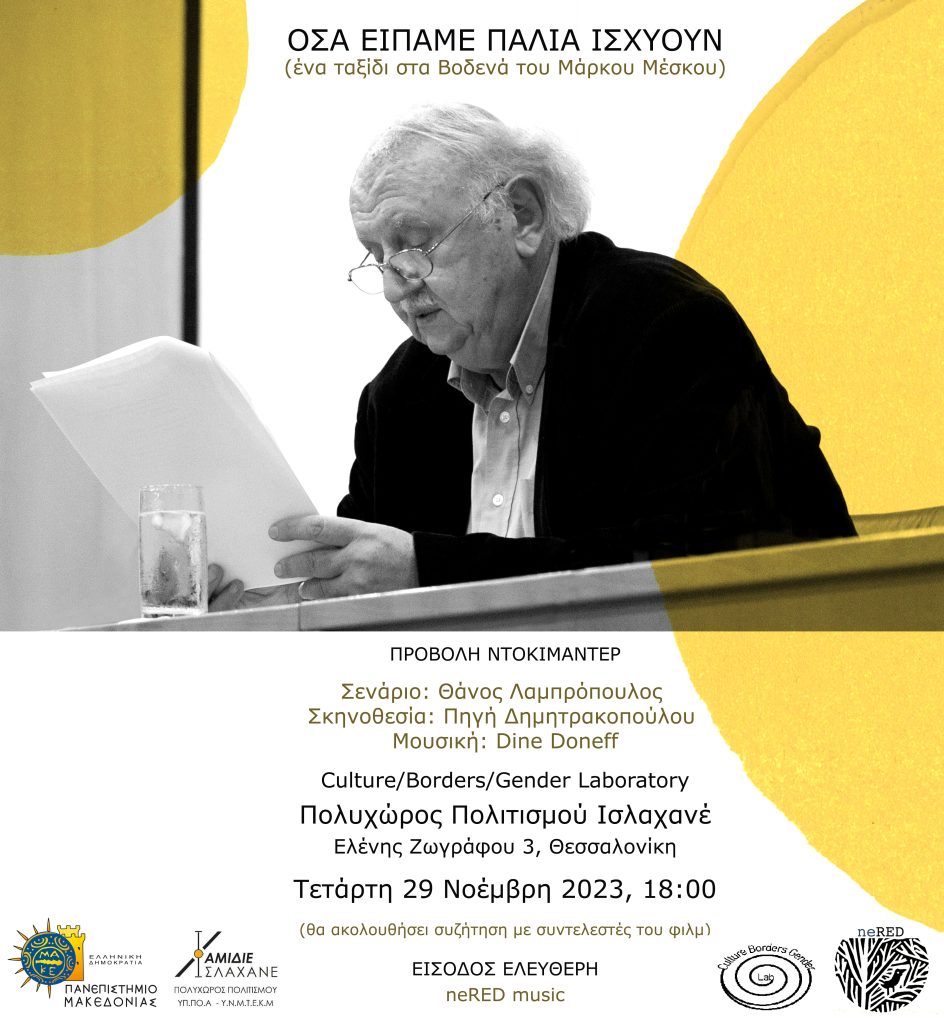ETHNOGRAFEIN
Critical dialogues, epistemological challenges,
field experiences, creative texts
“Borders and boundaries revisited:
Anthropological perspectives and public engagement”

Performance oikade (Aleksandros Plomaritis)
[provided by Dr. Christina Grammatikopoulou]
The online seminars series ETHNOGRAFEIN, since its inception in the spring of 2021, aims to contribute to a critical and interdisciplinary discussion about the theory and practice of ethnography, the epistemology of research, the significance of embodied experience, and also the modes of dissemination of the anthropological knowledge produced to both academic and non-academic audiences. The anthropological endeavour, both as a mode of research practice and a form of political writing, is based on the fundamental epistemological premises of critical evaluation, empathy, reflection, and self-referentiality and highlights the significance of a multifaceted analysis for the understanding of the local to the global.
Organisation and coordination: Fotini Tsibiridou – Ioannis Manos – Eleni Sideri
“Borders and boundaries revisited:
Anthropological perspectives and public engagement”
The 4th period of the ETHNOGRAFEIN online seminars, starting in October 2023 with the title “Borders and boundaries revisited: Anthropological perspectives and public engagement“, sets the study of geopolitical borders as its point of departure to examine the diverse phenomena and processes that abound in the contemporary state border regions and have multilevel consequences for the border populations.
By definition, studying borders and boundaries involves exploring the relationship between the ‘inside’ and the ‘outside’, or the “Self” and the “Other”. However, this is not a study of clear-cut dichotomies but an analysis of the interplay of multiple, multilevel, coexisting, but not necessarily interconnected processes. Boundaries are configured and take shape within a historically determined frame. They are subject to transformations in socio-political and economic contexts and are characterised by institutionally organised asymmetrical power relations. The complex making of borders and boundaries often emerges as a continuous interaction between mobility and enclosure, communication, coexistence, exchange, interaction, sameness and otherness, separation, exclusion, segmentation, connection and disconnection.
The anthropological study of geopolitical borders and their populations by anthropology was systematised in the mid-1990s. It was initially based on two paradigms: the study of the USA-Mexico and European borders. Nowadays, analysing social phenomena and cultural processes concerning borders and boundaries transcends disciplinary boundaries. Novel approaches such as the crοsslocations framework and the current discussion on decolonising methods and epistemologies have expanded the analytical and conceptual significance of the concepts of border and boundary. New methodological and interpretative tools have been created to study politics, trans-border mobility, materiality, transnationalism, topologies and genealogies of migration and refugeeness, border economics, and nation-state policies concerning spatial and cultural diversity, minority rights, and performative culture.
Based on detailed explorations of ethnographic research and anthropological insights, the 4th cycle of the ETHNOGRAFEIN online seminars critically examines the theoretical, epistemological and methodological complexities surrounding the study of geopolitical borders and their imposed dichotomies. Moreover, it discusses anthropology’s potential to bring forth the subtleties of human voices often overshadowed by macro narratives and create an inclusive, comprehensive dialogue in the public sphere that demonstrates the multiplicity of lived experiences.
4 December 2023
“Borders, Paradox and Power”
Yiannis Papadakis
Professor of Social Anthropology at the Department of Social and Political Sciences, University of Cyprus
04/12/2023
Yiannis Papadakis: Borders, Paradox and Power
Border studies have grappled with, on the one hand, the need for the use of common themes or concepts while, on the other, the need for contextual specificity. Borders are sites that embody different potentialities: division and contact, conflict and cooperation, security and anxiety, creativity and oppression, among others. In short, they are sites of the paradoxical. Paradox, it is argued, is the common overarching conceptual characteristic of borders but which specific potentialities are embodied in a border and what prevails as a result of the ensuing power struggles requires contextual specificity.
Cyprus, a divided island lying on various border lines, partly inside and partly outside the EU, presents a useful socio-political space in order to illustrate this argument by outlining the specific paradoxical aspects of its own border and the results of the ensuing power struggles.
Yiannis Papadakis is Professor of Social Anthropology at the Department of Social and Political Sciences, University of Cyprus. He is author of Echoes from the Dead Zone: Across the Cyprus Divide (I. B. Tauris, 2005, also translated in Greek and Turkish), co-editor of Divided Cyprus: Modernity, History and an Island in Conflict (Indiana University Press, 2006) and Cypriot Cinemas: Memory, Conflict and Identity in the Margins of Europe (Bloomsbury, 2014), and editor of a 2006 special issue of Postcolonial Studies on Cyprus, among others. His published work has focused on ethnic conflict, borders, nationalism, history education, cinema, post-colonialism, migration and cemeteries. His recent work engages with issues of migration and social democracy in Denmark and the comparative study of cemeteries in Cyprus, Denmark and currently Japan
Only those participants who wish to receive certificates of attendance register in the following form: https://forms.gle/JBJ8KUSJjg1sBW2c9
The registration form will receive answers one week before the seminar.
The seminars are held on Mondays from 16:00-18:00
————————————————————————–
Seminar Platform: ZOOM
Link https://zoom.us/j/8364531775?pwd=OVg3YVZlbmVCYWs3S0JYcEFGYlV1QT09
Meeting ID: 836 453 1775 Passcode: KB2JKa


